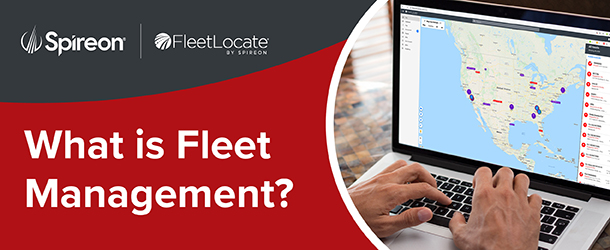What is Fleet Management?
Fleet Management is the management of commercial vehicles and assets such as vans, trucks, and construction equipment. It often includes using GPS tracking and software. Companies optimize their equipment and resources through various functions including streamlining routes, improving driver behavior and safety, enabling compliance with government regulations, recovering stolen vehicles, trailers or equipment, and optimizing vehicle maintenance.
Generally, fleet managers are the ones handling these fleet operations. Whether it be a lack of budget, time, or assets, fleet managers have to juggle fleet operations with limited resources. As if limited resources alone weren’t enough of a challenge, fleet managers have to deal with vehicle theft, as well as asset misuse. According to the National Labor Bureau, almost 6% of employees engage in side jobs.1 Other common fleet management challenges include costly fleet maintenance and having to deal with too many systems.
While managing a fleet is no simple task, the key responsibilities can be rolled up into five main buckets:
- Driver retention and performance
- Fuel management
- Vehicle / asset maintenance
- Safety & compliance
- Operational efficiency
Driver retention and performance
Driver shortage continues to be an on-going problem for the industry. And left unchecked, the shortage could swell to more than 160,000 drivers nationally by 2028.2 While many different factors influence this shortage, fleet managers must do what they can to retain drivers and ensure optimal performance. Keys to managing driver behavior and retention include driver safety, proper driver coaching, making sure drivers feel valued, and making sure that they have the tools needed to do their jobs efficiently.
Fuel management
With gas prices continuing to rise, proper fuel management is more important than ever. One key factor that affects fuel consumption is vehicle idling. According to Argonne National Laboratory-Center for Transportation Research, garbage trucks alone waste nearly 27.5 million gallons of fuel per year through idling. Fleet management tools such as Spireon’s FleetLocate have idling reports that can help you modify driver behavior in order to manage excessive idling.
Vehicle / asset maintenance
In addition to wasting fuel, idling also affects a vehicle’s wear and tear. Idling for one hour every day for one year is equivalent to 64,000 miles of engine wear. That results in excess annual maintenance costs of as much as $9,472 per truck.3
With today’s Great Resignation being an on-going topic across all industries, you’ll want to keep your mechanics just as happy as your drivers. By having a proper fleet management tool in place, you can streamline your maintenance process through real-time alerts of a vehicle arrival at maintenance facilities. You can also proactively monitor a vehicle’s health, and schedule maintenance accordingly to avoid unscheduled maintenance that would surprise your mechanics and impact the bottom line.
Safety & compliance
Another huge factor impacting the bottom line in fleet management is safety and compliance. The annual accident rate for commercial fleets is ~ 20%, with some industries, even higher.4
Fleet crashes result in lost productivity, lost revenue from missed sales calls, and potential third-party liability claims from an at fault crash. While certain accidents are unavoidable, modifying driver behavior can help improve overall safety. Fleet management solutions can give you reports of speeding, hard braking, and alert drivers of seat belt use. Video-based safety solutions can further modify behaviors with distracted driving alerts. Such solutions help prevent accidents and provide video evidence to exonerate drivers and protect your business.
Over the years the FMCSA has also added more compliance rules with the goals of improving overall safety. Select fleet management vendors can provide you a one-stop shop for fleet management and compliance.
Operational efficiency
With all the different challenges and functions fleet management requires, everything ultimately leads to operational efficiency. Fleet managers have to maximize vehicle utilization and ensure on-time arrivals to keep customers happy. Using GPS tracking solutions, fleet managers can track vehicles in real time and setup geofencing to know when a vehicle isn’t where it should be. Knowing where vehicles and assets are at all times allows flexibility to route changes to the closest driver.
- https://www.automotive-fleet.com/303123/fleet-safety-metrics-reverse-negatively-accidents-increase
- https://www.shrm.org/resourcesandtools/hr-topics/talent-acquisition/pages/how-trucking-companies-are-responding-to-a-critical-driver-shortage.aspx
- https://mcsmag.com/true-cost-of-idling/
- https://www.automotive-fleet.com/303123/fleet-safety-metrics-reverse-negatively-accidents-increase

